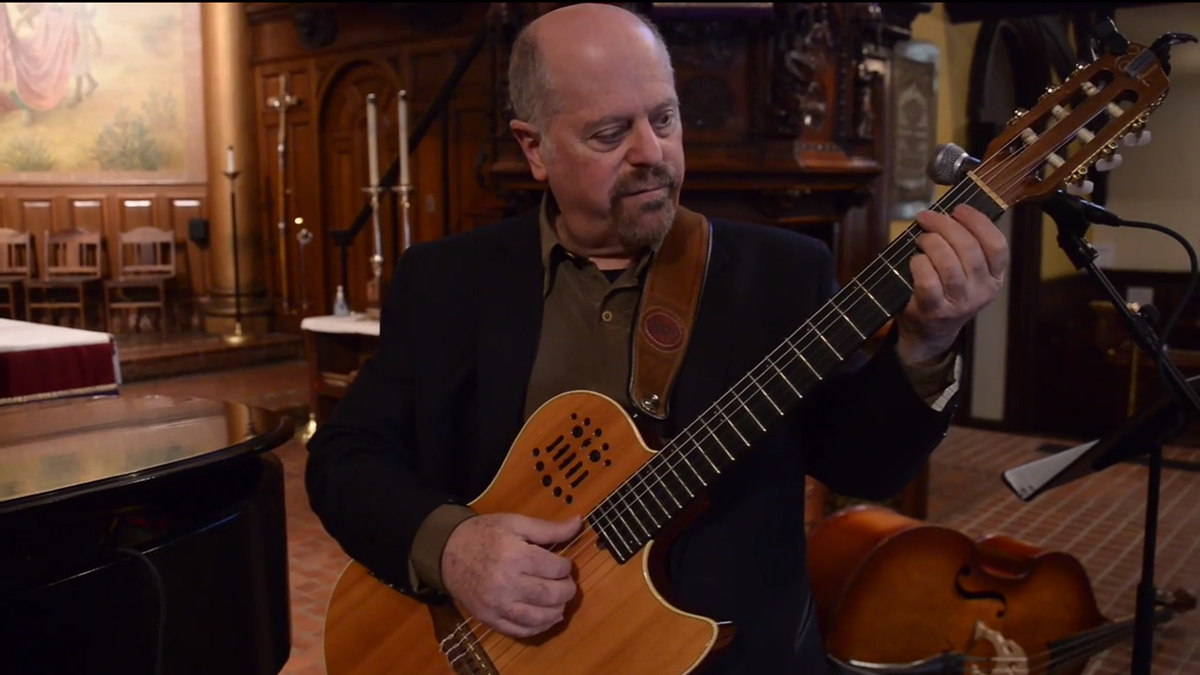Orlando Haddad finds Philly’s bossa nova beat

Blame it on the Beatles. That’s how Brazilian-born musician and composer Orlando Haddad, 61, explains his leap from Beethoven to rock.
“I studied classical piano from the age of eight,” says Haddad, a longtime resident of Lansdowne. “When I was 12, I walked into a church and saw two kids playing Beatles music on guitars. That was it! I began making money with my own rock band, singing Beatles songs in Portuguese.”
While this was a common scenario across America, it came as a jolt to Haddad’s traditionally minded parents in Brazil. His physician father and classical pianist mother had very different plans for their youngest son. “They expected me to follow in my father’s and brothers’ footsteps and become a doctor,” says Haddad.
Under parental pressure, Haddad enrolled as a pre-med student in Rio. Living in Ipanema, wandering along its famous beach and absorbing the city’s vibrant music scene, Haddad finally decided to pursue his dream. “It was the golden age of Brazilian music. I found a classical guitar teacher but never abandoned my love for bossa nova, which combined jazz and samba. I was also influenced by the avant garde electronic music of Miles Davis and Santana.”
A marriage of Brazilian and American jazz
At the time, Brazil was under a military dictatorship, and opportunities to study music were limited. Like many of his countrymen, Haddad came to the United States, where he studied classical music composition at the North Carolina School of the Arts. “One day, Patricia King, a female student, came up to me and asked me to play her a Brazilian tune. I was embarrassed that I only could remember one,” recalls Haddad.
King, an aspiring vocalist, pianist and composer of Italian-American heritage, encouraged Haddad to return to his musical roots and put forth a provocative idea: Why don’t they make beautiful music together? “We called ourselves Minas, after Minas Gerais, the Brazilian state I’m from,” says Haddad.
They soon married and lived in Brazil for two years, where King absorbed the Portuguese language, along with the cuisine, music and culture.
They returned to the States in 1984 and decided to live in Philadelphia because Patricia had a brother here. “At the time, there wasn’t a Brazilian community here. Not a single Brazilian restaurant or band,” says Haddad, “but the music scene here was very welcoming and vibrant. We played in several area clubs, including six years of being the house band at Apropos at Broad and Walnut.”
Haddad and his wife also formed PhillySamba, which introduced many young local musicians to the throbbing percussion of Brazilian carnival music, known in Portuguese as bateria. “A lot of the people we taught have gone on to form their own samba percussion bands, including Alo Brasil and PhillyBloco.”
Along with performing, Haddad taught Brazilian jazz and percussion at University of the Arts for 10 years. He earned a master’s degree in arts administration at Drexel University and another master’s degree in music composition at Temple University. “My degree in arts administration really helped me understand the business of being a musician,” says Haddad.
‘A real Philadelphia project’
Twice a year, Haddad and his wife returned to Brazil to visit his family, jam with local musicians and work on recordings. “We’re really excited about our newest CD, “Symphony in Bossa,” which pays homage to the great bossa nova classics by Jobim and Gilberto, including ‘The Girl from Ipanema,’ ‘Desafinado’ and ‘Waters of March.'”
“It’s our biggest project to date, taking over 10 years to complete. It was also the most expensive. We raised half the money through a Kickstarter campaign,” explains Haddad. “People from all around the world contributed. This enabled us to produce a recording with very high quality.”
“It’s a real Philadelphia project. It was born here, and Philly has a lot of great string players. The CD includes the best jazz musicians in town, including Larry McKenna on tenor sax and the newly created Jazz Orchestra of Philadelphia with Terell Stafford.” “Symphony in Bossa” was arranged for big band and strings by the late Bill Zaccagni, a former teacher at UArts who also arranged for Patti LaBelle.
Haddad has high expectations for “Symphony in Bossa,” which was officially released on March 14. “I would like this to be the most significant contemporary bossa nova recording made outside of Brazil,” he says.
After this freezing winter, the timing of Haddad’s CD release couldn’t be better. As Jobim’s lyrics say, “And the river bank talks of the waters of March. It’s the promise of life, it’s the joy in your heart.”
WHYY is your source for fact-based, in-depth journalism and information. As a nonprofit organization, we rely on financial support from readers like you. Please give today.

